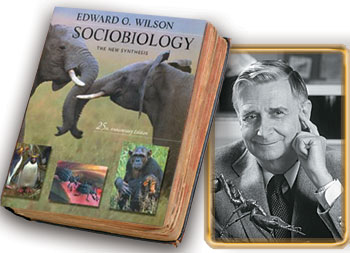In the wake of The Origin of Species and The Descent of Man, a great many evolutionists began speculating how human social behavior, emotions, judgments and ideas—all attributes of the human spirit—might have been shaped by evolution. According to the most widespread error, if our bodies' appearance and functioning were shaped by evolution, then the behavior our bodies exhibit must have been shaped by evolution, too. Evolutionists, unable to account for how the biological structures in living things came into being, now began inventing tales regarding the so-called evolution of the human soul.
 |
| E. O. Wilson and his book Sociobiolo-gy: A New Synthesis |
In The Descent of Man Darwin claimed that in the future, evolution would constitute the foundation of psychology, and expressed his illusory claim in these terms:
In the distant future I see open fields for far more important researches. Psychology will be based on a new foundation, that of the necessary acquirement of each mental power and capacity by gradation. Light will be thrown on the origin of man and his history.181
The first comprehensive initiative to account for the origins of human and animal behavior in evolutionary terms came from Harvard entomologist Edward O. Wilson. Despite the complete failure of Wilson's initiative, it came to be known as "sociobiology."
In Sociobiology: The New Synthesis, published in 1975, Wilson maintained that animal behavior had a completely biological foundation. Basing his error on biological evolution, he thought that particular genes controlled human and animal behavior. His true field of expertise was insects, which he referred to in the first 26 chapters of his book. In the 27th chapter, he attempted to adapt these claims to human beings. His 1978 book Human Nature speculated that human genes were responsible for such behavior as hatred, aggression, xenophobia, amicability, homosexuality and characteristic differences between men and women. None of Wilson's claims went any further than conjecture.
None of the claims made by him and his supporters have ever been backed up by scientific findings. On the contrary, all scientific data have shown that his ideas are utterly mistaken.
Another of Wilson's unscientific claims is that living things are nothing more than gene carriers, and that their most important responsibility is to transmit those genes to subsequent generations. In his view, evolution is actually the evolution of genes. In his book Sociobiology: The New Synthesis, he expresses this unscientific claim thus:
In a Darwinist sense, the organism does not live for itself. Its primary function is not even to reproduce other organisms; it reproduces genes, and it serves as their temporary carrier. Each organism generated by sexual reproduction is a unique, accidental subset of all the genes constituting the species. Natural selection is the process whereby certain genes gain representation in the following generations superior to that of other genes located at the same chromosome positions. ... But the individual organism is only their vehicle, part of an elaborate device to preserve and spread them with the least possible biochemical perturbation. Samuel Butler's famous aphorism, that the chicken is only egg's way of making another egg, has been modernized: the organism is only DNA's way of making more DNA.182
Wilson's claims were solely the result of evolutionist preconceptions. Even among evolutionists, some objected to Wilson's conjecture. One of them was Stephen Jay Gould:
But Wilson makes much stronger claims. Chapter 27 ... is primarily, an extended speculation on the existence of genes for specific and variable traits in human behavior – including spite, aggression, xenophobia, conformity, homosexuality, and the characteristic behavioral differences between men and women in Western society.183
With the evolutionist zoologist Richard Dawkins, evolutionist speculation concerning human behavior that began with Wilson reached an unbelievable and illogical peak.
 |
| Genes are inanimate structures made up of atoms and devoid of intelligence. It is illogical to refer to them as conscious entities making decisions and selections. Evolutionary psychology, however, is based on this illogicality Violence and aggression are not a legacy inherited from man's alleged animal ancestors and encoded in our genes. Rather, they are results of the poor moral |
As a result of the unscientific claims made about genes by sociobiology and its extension, evolutionary psychology, the "selfish gene" deception was put forward and popularized by Richard Dawkins.
According to him, a living thing's most important objective is survival and reproduction—in short, protecting its genes and passing them on to subsequent generations. This claim is entirely speculation.
According to this conjecture of the theory of evolution, inanimate chemical substances at one time organized themselves (however that actually happened), and established a DNA-based system capable of reproducing itself. The first organism to emerge from this imaginary chemical soup was a gene with no purpose other than to multiply. Somehow, it "decided" to copy itself, and began doing so, producing new genes. As a result of errors during this copying process, genes with different features emerged. Later, these genetic materials "learned" in some way how to constitute various bodies and thus reproduce these genetic materials more effectively. The genes that encoded the best body were thus copied more effectively than others. Evolutionists maintain that as a result of this, the how and why of which they can't account for, bodies gradually developed in terms of form and function. This story, which could not possibly have taken place, constitutes one of the fundamental claims of modern Darwinism. Yet evolutionists are also perfectly well aware that it is impossible for the human body, any organ in it, the cells that comprise such organs, or even a single component of these cells to have brought itself into being.
Dawkins, however, took this myth as his starting point and claimed that there is "competition" between genes. He set out his distorted view of humanity in his book The Selfish Gene:
We are survival machines—robot vehicles blindly programmed to preserve the selfish molecules known as genes. This is a truth which still fills me with astonishment. Though I have known it for years, I never seem to get fully used to it. One of my hopes is that I may have some success in astonishing others...184
 |
According to Dawkins' illogical claim, a human being is simply a gene-bearing robot. Its only reason for existence is to multiply the genes it bears, support them in competition with other genes, and to pass them on to subsequent generations. It is evident that this claim, ignoring the existence of the soul and regarding the human being as a mechanical device, lacks any realistic aspect.
Nonetheless, the majority of evolutionists seeking a materialist explanation have supported this unscientific theory of Dawkins'. In his book Human Nature, Wilson maintains that human beings acquire importance and purpose only through their genes:
... no species, ours included, possesses a purpose beyond the imperatives created by its own genetic history (i.e., evolution)... The species lacks any goal external to its own biological nature.185
According to this materialistic belief with no scientific foundation, if the continuation of genes is the only aim, then the human beings responsible for protecting them must be as selfish and ruthless as possible in the interests of their genes. According to Dawkins and his supporters, "selfish" genes will be victorious in that competition. In The Selfish Gene, Dawkins summarizes this perverted Darwinist viewpoint:
We, and all other animals, are machines created by our genes. Like successful Chicago gangsters, our genes have survived, in some cases for millions of years, in a highly competitive world. This entitles us to expect certain qualities in our genes. I shall argue that a predominant quality to be expected in a successful gene is ruthless selfishness. This gene selfishness will usually give rise to selfishness in individual behavior. However, as we shall see, there are special circumstances in which a gene can achieve its own selfish goals best by fostering a limited form of altruism at the level of individual animals. "Special" and "limited" are important words in the last sentence. Much as we might wish to believe otherwise, universal love and the welfare of the species as a whole are concepts that simply do not make evolutionary sense.186
 |
| Nature does not consist solely of a fight to the death. Many living things display exceedingly altruistic behavior, both towards their own young and towards others. |
According to Dawkins' ignorance, since the genes borne by human beings are selfish, man must be selfish, too. That being so, "selfish robots" can be expected to resort to any measures in order to protect and preserve their genes. There is no longer any reason not to commit murder, theft or rape. One cannot expect "selfish machines" to obey any moral law, or to behave in a conscientious, ethical way. Under these circumstances, the killing of one human being is not a crime or immoral, but a genetic compulsion to further one's own interests. Since genes are selfish, so is their behavior. Dawkins' view of human beings is exceptionally dangerous and implies the fragmentation of social morality.
In fact, however, the selfish gene claim is illogical and nonsensical, since Dawkins and others like him describe genes as entities with consciousness and willpower. Yet genes are long chains of DNA—spiral ladders of nucleic acids held together by sugar and phosphate strands. In the same way that H2O (water)or H2SO4 (sulfuric acid) are molecules, so is DNA a molecule. In the same way that it is impossible to speak of "selfish water," "selfish salt" or "jealous sulfuric acid," neither can one speak of "selfish genes."
Evolutionists depict human beings as collections of matter, and somehow try to ascribe reasoning somewhere within that assortment. That they can ascribe reasoning and consciousness to genes shows how inconsistent the theory of evolution has become. Today, Darwinism maintains that there is reason and consciousness in molecules, and in the inanimate atoms that comprise these molecules, and has replaced the paganism that ascribed reason and consciousness to idols of stone or wood.
 |
| Mothers make sacrifices for their children not, as evolutionists would have us believe, to protect their genes, but out of feelings of love, affection and protectiveness. |
According to the theory of evolution, in nature there is a struggle to death in which only the strong survive. However, it can be observed that living things generally help one another, make sacrifices for each other, and even risk their lives for the benefit of others. To account for this fact, which is totally at odds with the theory of evolution's basic claim, Wilson proposed a number of groundless hypotheses which statements went on to form the basis of sociobiology. Wilson based his explanations on another deception: W. D. Hamilton's "kin selection," according to which a living thing protecting its young or another member of the group is not engaging in altruistic behavior, but is actually protecting its own "selfish genes." Since the objective is to pass on its genes to subsequent generations, and since a mother's genes exist in her offspring, then a mother defending her offspring at the cost of her own life is effectively defending her own genes. In other words, selfishness actually underpins her self-sacrifice!
This is a most nonsensical claim! First and foremost, no animal in nature possesses awareness of its own genes, and therefore can't feel motivated to protect them. In addition, it can't know that its genes are also present in its offspring or cousins, and so it has no reason to sacrifice its life for them. It is impossible for genes—unconscious chains of molecules—to direct a living thing in this way.
Moreover, there are many instances in nature of animals assisting not just those of their own species that bear their own genes, but others as well. Evolutionists cannot explain this, because the idea that a creature engaging in altruistic behavior is actually protecting its own genes is totally nonsensical.
Neither is the evolutionists' quandary resolved by claiming that the urge to protect its young is encoded in the genetic structure of living things, because then the question arises of how such complex behavior was encoded in the genes in the first place. The theory of evolution can't explain how even a single gene might have come into existence through coincidences, so it's impossible for it to explain how information encoded in the genes could have come into being by chance. Every piece of information encoded in the genes is the creation of God, the Lord of infinite knowledge and wisdom.
Sociobiologists seek to apply the same claim about animals' altruistic behavior to human beings. In other words, when a mother protects her child from danger without a moment's hesitation, she is actually concerned over protecting her genes. Evolutionists' rejection of attributes belonging to the human soul and their attempts to account for such phenomena in terms of evolution are based on no scientific evidence whatsoever. With their illogical claims, evolutionists disregard the human consciousness and conscience. The fact remains that a human being is possessed of a soul and the capacities for reasoned thought and judgment, and can distinguish between right and wrong. When a mother makes a sacrifice for her child, she does so because she loves that child, feels affection and compassion for him, and makes that sacrifice because she sees him as weak and assumes the responsibility of protecting him. When her child is in pain, for instance, she puts herself in the child's position and will be prepared to make any sacrifice to relieve his pain. These are attributes that a robot or "gene bearing machine," so beloved of evolutionists, can never possess.
In fact, evolutionists are well aware that evolution can never account for attributes belonging to the human soul. For example, the evolutionist Robert Wallace says the following in his book The Genesis Factor:
I do not believe that man is simply a clever egotist, genetically driven to look after his own reproduction. He is that. But he is at least that. He is obviously much more. The evidence for this is simple and abundant. One need only hear the Canon in D Major by Johann Pachelbel to know that there are immeasurable depths to the human spirit...187
Wallace stresses a point of the greatest importance. According to evolutionists' unrealistic definition, a human being is merely a machine bearing genes. It's thus impossible for such an entity to take pleasure from music, enjoy watching a film or even to produce one, to read or write books, to learn what has been read, or to exchange ideas. Human beings are clearly very different from how evolutionists portray them, and everyone can see the proof of this in themselves. Evolutionists' unscientific claims can never answer the questions of how a human being, with a capacity for deep thought and feeling emotions and enjoyment, came into being, and what was the origin of those characteristics.
Baby Killings: A Barbarity Supported By Evolutionary Psychology |
| In 1996-1997 the newspapers reported two shocking cases of baby killings. In the first, two 18-year-old college students brought a child into the world in a hotel room, killed it, and threw the body into a dumpster. In the other, an 18-year-old girl left her school prom and gave birth in a bathroom stall, left the dead child in a garbage can and returned to the dance hall. Both cases resulted in murder charges. While most people ascribed these events to moral collapse or mental disturbance, Steven Pinker, a professor of psychology from Massachusetts Institute of Technology, offered a terrifying explanation: genetic compulsion. In his article published in the New York Times, Pinker claimed that killing a baby on the day it was born did not represent a mental illness because this had been an accepted practice in many cultures throughout history: Killing a baby is an immoral act, and we often express our outrage at the immoral by calling it a sickness. But normal human motives are not always moral, and neonaticide does not have to be a product of malfunctioning neural circuitry or a dysfunctional upbringing. 1 The most striking part of Pinker's quotation is the expression "but normal human motives are not always moral." This reveals an abnormality in his way of looking at things. In other words, even if some behavior is immoral, it can still be regarded as legitimate because it is part of "normal" motives particular to human beings. According to Pinker, the killing of a newborn baby when circumstances make that necessary is allegedly "normal" behavior. According to evolutionists' fictitious claims, mothers under primitive conditions need to make a difficult choice between caring for their already existing offspring and feeding newborn ones. Therefore, if a baby is born sick or is unlikely to survive, then she may prefer to try again by eliminating that individual. This assumption is neither scientific nor true, of course. Nevertheless, a Darwinist mindset propels Pinker to endorse this savagery. This claim proposed by Pinker and others like him will do obvious damage to society. When the concept of genetic compulsion is advanced in moral choices, then someone who commits murder can say, "I had to do it—my genes made me." In such a case, since genes cannot be punished, there is no crime and no criminal. In his claims, Pinker is discounting human reason and conscience, imagining that everything can be explained in terms of genes. Encountering a reaction from society, he makes a few changes to his terminology, but this time finds himself in an internal inconsistency. They make us see it not as a moral horror, but as a genetically encoded evolutionary adaptation...2 Pinker is able to defend the claims in question despite their resting on absolutely no scientific evidence. One of the criticisms of Pinker's claims is that they consist of nothing more than conjecture based on evolutionists' illusory world views. Ferguson, for example, criticized Pinker's logic and stated that he offered no evidence for his claims. The fact is, all of evolutionary psychology is based on proofless conjecture and the power of the imagination. In his book The Wedge of Truth, Phillip Johnson says: Basically, evolutionary psychology proceeds by erecting a mountain of speculation on the basis of fragmentary evidence about primitive cultures.3 Ferguson makes this diagnosis on the subject in his criticism: Conjecture solidifies into fact; the fact then becomes a basis for further conjecture, which evolves into another factual premise, and so on.4 Notes1. Steven Pinker, "Why They Kill Their Newborns," New York Times, 2 November 1997. 2. Andrew Ferguson, "How Steven Pinker's Mind Works", The Weekly Standard, January 12, 1998, p. 16. 3. Philip Johnson, The Wedge of Truth, Intervarsity Press, Illinois, 2000, p. 113. 4. Andrew Ferguson, "How Steven Pinker's Mind Works," The Weekly Standard, p. 16. |
 |
| ... the handiwork of God Who perfects all things... (Surat an-Naml, 88) |
With the sequencing and analysis of the human genome, the view became widespread that DNA possessed tremendous power and that genes played an enormous role in determining who we really are. Almost every day, newspapers featured articles suggesting that we are under the control of our own genes: "Scientists Target Genius Gene," "Kennedy Tragedies Put Down to Risk Taking Gene," "Scientists Say Research on Male Siblings Proves the Existence of a 'Homosexual Gene.'" Reports about genes controlling everything from schizophrenia to jealousy, from alcoholism to television watching habits, appeared in scientific and non-scientific journals.
People reading all these headlines thought that all kinds of attributes, from intelligence to character, from success to failure, were encoded in the human genome; and some people began believing, erroneously, that our lives could be boiled down to a formula.
Research into the human genome is exceedingly valuable, and studies on human genetic structure have yielded important information about a number of diseases. However, as those running the Human Genome Project and scientists involved in the field have clearly stated, this in no way justifies loading unrealistic functions onto the genes. Research reveals that human genes play so small a role in character, behavior and thinking as to be insignificant. In an article titled, "The Human Genome Map: The Death of Genetic Determinism and Beyond," Mae-Wan Ho of the Institute of Science in Society, says the following:
The number of genes is far less than needed to support the extravagant claims throughout the past decade that individual genes not only determine how our bodies are constructed, what diseases we suffer from, but also our patterns of behaviour, our intellectual ability, sexual preference and criminality.188
Francis S. Collins, director of the National Human Genome Research Institute, makes it clear that genes are not what makes human beings human. In an article titled "Heredity and Humanity:Have No Fear. Genes Aren't Everything," Collins says:
 |
| You who believe! Enter Islam totally... (Surat al-Baqara, 208) |
Fortunately, ten years of intensive study of the human genome have provided ample evidence that these fears of genetic determinism are unwarranted. It has shown us definitively that we human beings are far more than the sum of our genetic parts. Needless to say, our genes play a major, formative role in human development—and in many of the processes of human disease; but high-tech molecular studies as well as low-tech (but still eminently useful) studies of identical and fraternal twins make it perfectly evident that our genes are not all-determining factors in the human experience.189
In the same article, Collins states that genes have no major effect on human behavior. He explains how looking at a criminal's genes to see if this person has a genetic predisposition to crime and determining a punishment in that light could lead to unjust outcomes:
But what about non-disease-related traits, such as intelligence and violent behavior? ... The discovery of a prevalent gene variant strongly correlated with violence could have a profound effect upon our millennia-old understanding of free will, and weigh down the scales of justice in two equally dangerous ways. If someone who commits a violent crime has the gene variant, his lawyer could use a DNA defense ("If it's in the gene, the man is clean!"), and the defendant could well be seen by a judge and jury as not responsible for his actions. Yet it is also possible to imagine a scenario in which someone who has never even contemplated a violent act is found to have the gene variant and then subjected to the presumption of guilt (or even sent away to a postmodern-day leper colony) for the rest of his life.
If genes truly controlled behavior, our justice system and its guiding principle of equal protection would not be the only casualties. How would our concept of equal opportunity survive? What about the idea of merit? Just think of the frightening "genetocracy" depicted in the movie Gattaca (and note the letters that make up its name), a world in which children are assigned to castes at birth, based on an assessment of their intellectual capacity and professional potential as inscribed in their DNA.190
In his article, Collins describes the illogicality of claiming that behavior is encoded in the genes with a quotation from the biologist Johnjoe McFadden:
 |
| They will ask you about the Spirit. Say: "The Spirit is by command of my Lord. You have only been given a little knowledge." (Surat al-Isra', 85) |
To build on a metaphor offered by the biologist Johnjoe McFadden, looking for genes that encode our unique behaviors and the other products of our minds is like analyzing the strings of a violin or the keys of a piano in the hope of finding the Emperor Concerto. Indeed, the human genome can be thought of as the grandest of orchestras, with each of our approximately thirty thousand genes representing a unique instrument playing in the wondrous and massive concert that is molecular biology. Each instrument is essential, and each must be in tune to produce the proper (and highly sophisticated) musical sound. Likewise, genes are essential to the development of the brain, and must be "in tune" to produce functioning neurons and neurotransmitters. But this emphatically does not imply that genes make minds any more than a viola or a piccolo makes a sonata.191
Collins devotes the end of his article to illuminating another reason why human attributes cannot stem from their DNA, and draws attention to God's superior creation:
For many of us, there is still another powerful reason, wholly apart from the mechanics of science, to reject the notion that DNA is the core substance of our humanity. It is the belief [in] a higher power... Of course, some scientists and writers dismiss this spiritual notion as pure superstition. [This is certainly a great error of theirs!] Thus Richard Dawkins has observed that "we are machines built by DNA whose purpose is to make copies of the same DNA... It is every living object's sole reason for living." Really? Is there nothing about being human that is different from being a bacterium or a slug?
Can the study of genetics and molecular biology really account for the universal intrinsic knowledge of right and wrong common to all human cultures in all eras...? Can it account for the unselfish form of love that the Greeks called agape? Can it account for the experience of feeling called to sacrifice for others even when our own DNA may be placed at risk? While evolutionary biologists proffer various explanations for human behaviors that undermine the efficient propagation of our genes, there is something about those claims that rings hollow to us.
The notion that science alone holds all the secrets of our existence has become a religion of its own… Science is the proper way to understand the natural, of course; but science gives us no reason to deny that there are aspects of human identity that fall outside the sphere of nature, and hence outside the sphere of science.192
 |
| God does not forgive anything being associated with Him but He forgives whoever He wills for anything other than that. Anyone who associates something with God has gone very far astray. (Surat an-Nisa', 116) |
As Collins noted, chains of molecules consisting of carbon-hydrogen-nitrogen-oxygen compounds cannot possibly endow a person with such feelings as love, devotion, taking pleasure from art, rejoicing, maternal emotions, desire or self-sacrifice. If the soul is discounted, a human being is nothing more than flesh and bone. The genes, which are themselves material entities, do not permit this assembly of flesh and bone to think, make mathematical calculations, enjoy the food it consumes, miss a friend it has not seen for a long time, or take pleasure in something beautiful. A human being is an entity created by God, very different and separate from the body, its brain and cells and genes. It is revealed in the Qur'an that a human being is an entity with a soul given by God:
He Who has created all things in the best possible way. He commenced the creation of man from clay; then produced his seed from an extract of base fluid; then formed him and breathed His Spirit into him and gave you hearing, sight and hearts. What little thanks you show! (Surat as- Sajda, 7-9)
The human soul is breathed into man by God. Evolutionist materialists, unwilling to accept the existence of God and that human beings possess metaphysical characteristics, seek to keep spreading the lie that everything is encoded in the genes—which obviously cannot create the human soul, though evolutionists blindly ignore this.
Actually, this distorted belief is by no means new. Throughout history, it has been known under the name of paganism. In the same way that the ancients made idols out of wood and then claimed that these were their deities, the theory of evolution maintains that genes are the purpose and creator of everything. (Surely God is beyond that!) This primitive and dogmatic point of view, which was hoped to provide a basis for the theory of evolution, has been invalidated by scientific findings. Even Collins, who led the historic research into genes, openly states that genes actually have no power, and that human beings are metaphysical entities.
Paganism, ascribing divine status to material entities with no power of their own, is a tradition that has persisted down the ages and, in the present day, is maintained by the evolutionist mindset. In the Qur'an, God reveals this about those who ascribe divine status to entities devoid of any power:
But they have adopted deities apart from Him which do not create anything but are themselves created. They have no power to harm or help themselves. They have no power over death or life or resurrection. (Surat al-Furqan, 3)
In another verse, God reveals the following regarding this belief's perverted nature:
Say: "Call on those you make claims for apart from Him. They possess no power to remove any harm from you or to change anything." (Surat al-Isra', 56)
God's commandment to anyone of reason is this:
Do not call on something besides God which can neither help nor harm you. If you do, you will then be wrongdoers. (Surah Yunus, 106)
180. Barbara Burke, "Infanticide," Science 84, May 1984, p. 29.
181. Charles Darwin, On the Origin of Species, 1859, p. 449.
182. E. O. Wilson, Sociobiology: The New Synthesis, Cambridge, 1975, p. 3.
183. Gould, Ever Since Darwin.
184. Richard Dawkins, The Selfish Gene, 1976, Oxford: Oxford University Press, opening pages.
185. E. O. Wilson, On Human Nature, Cambridge, Mass.: Harvard University Press, 1978, pp. 2-3.
186. Dawkins, The Selfish Gene, 2nd. ed.,1989, Oxford: Oxford University Press., p. 2.
187. Robert Wallace, The Genesis Factor, New York: William Morrow and Co.,1979, pp. 217-218.
188. Mae-Wan Ho, "The Human Genome Map, the Death of Genetic Determinism and Beyond," ISIS Report, February 14, 2001; http://www.i-sis.org.uk/HumangenTWN-pr.php
189. Francis S. Collins, Lowell Weiss ve Kathy Hudson, "Have no fear. Genes Aren't Everything," The New Republic, 06/25/2001.
190. Ibid.
191. Ibid.
192. Ibid.